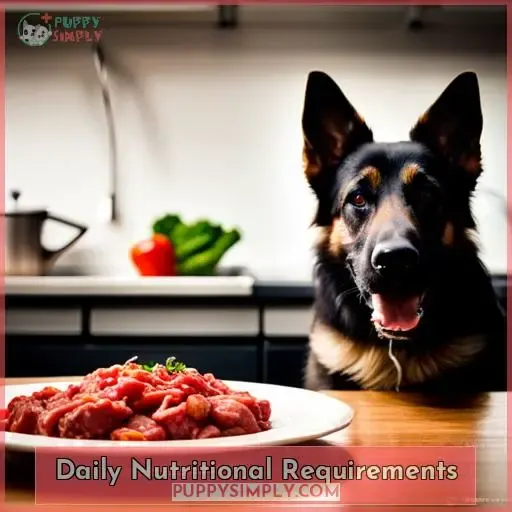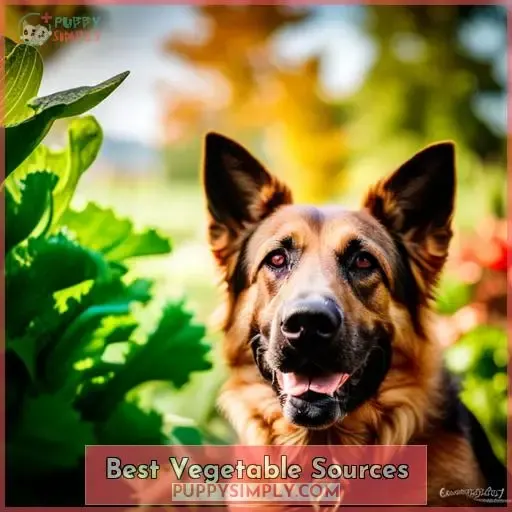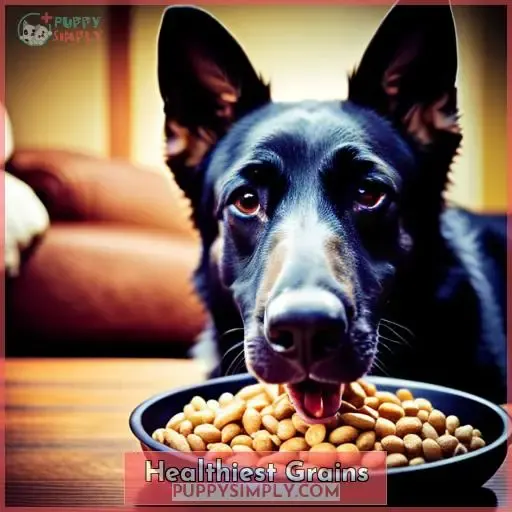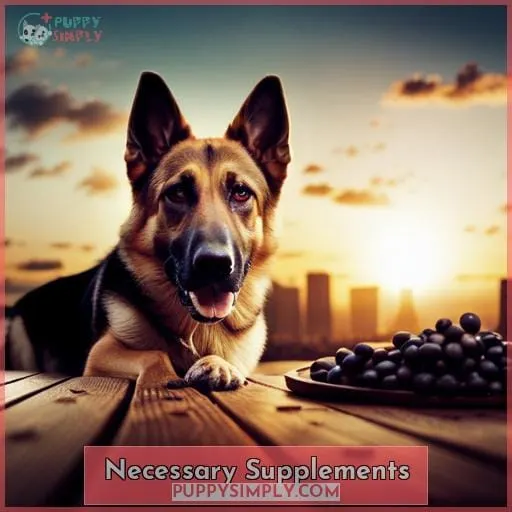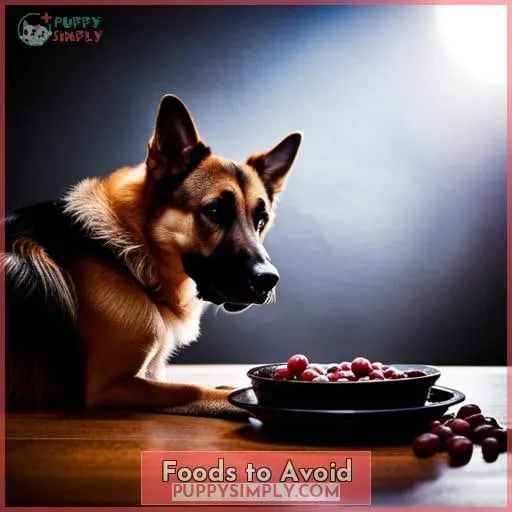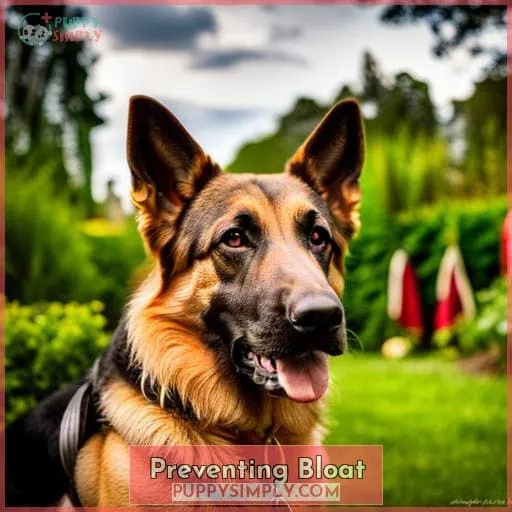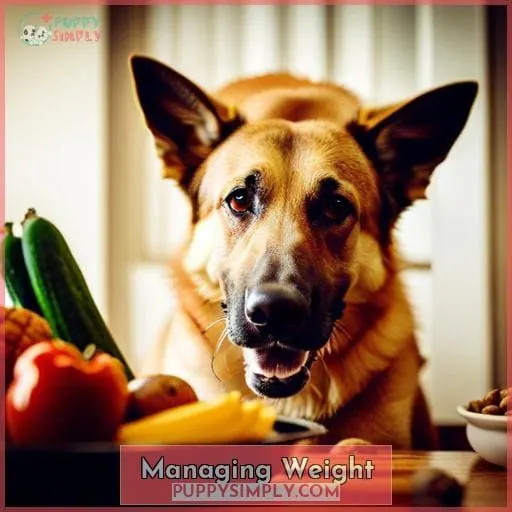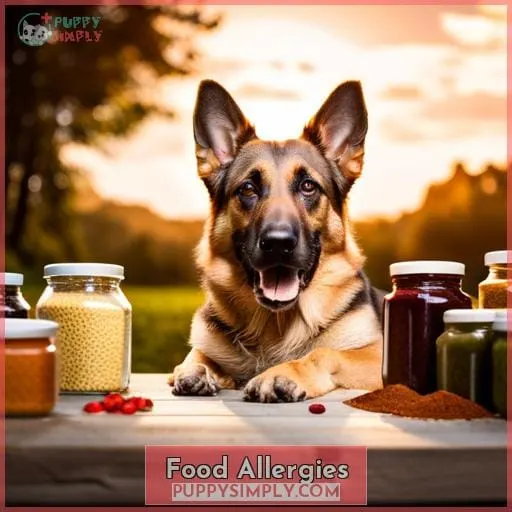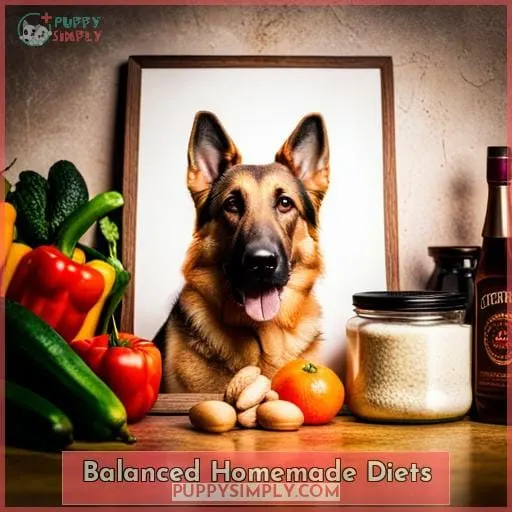This site is supported by our readers. We may earn a commission, at no cost to you, if you purchase through links.
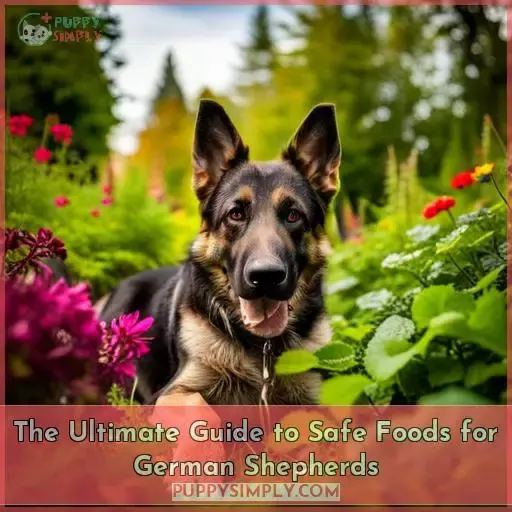 Did you know chocolate can be fatal for German Shepherds?
Did you know chocolate can be fatal for German Shepherds?
As their trusted nutrition guide, I’m letting you in on the ultimate insider info on safe foods.
Arm yourself with the knowledge to protect your loyal companion from harm.
Together, we’ll navigate the do’s and don’ts – so you can look into those devoted eyes knowing you’ve taken every precaution to give your furry friend a long, vigorous life.
Now let’s dive in!
Table Of Contents
- Key Takeaways
- Daily Nutritional Requirements
- Best Meat Sources
- Best Vegetable Sources
- Healthiest Grains
- Necessary Supplements
- Foods to Avoid
- Preventing Bloat
- Managing Weight
- Food Allergies
- Balanced Homemade Diets
- Frequently Asked Questions (FAQs)
- What table scraps or human foods can I safely give my German Shepherd as treats?
- How often should I switch between different protein sources in my German Shepherd’s diet?
- My German Shepherd is a picky eater – what tips do you have for getting them to eat healthier?
- Are there any differences in diet for working line vs. show line German Shepherds?
- How do I know if my German Shepherd is allergic to a certain ingredient if they don’t show obvious allergy symptoms?
- Conclusion
Key Takeaways
- Adult GSDs need about 18-22% protein from sources like poultry, fish, legumes, and dairy.
- The best meat choices are lean cuts of beef, skinless chicken, and low-mercury fish.
- Vegetable sources should provide vitamins and minerals. Good options are carrots, green beans, broccoli, and spinach.
- Consider omega-3 and glucosamine supplements to support skin, coat, joints, heart health and more.
Daily Nutritional Requirements
You’ll need to calculate your dog’s daily caloric intake based on age, activity level, and health.
German Shepherds typically need 18% to 22% protein in their diet, although puppies and nursing mothers need 22%.
Providing your dog with a high-quality diet rich in protein, vitamins, fats, carbohydrates, minerals, and fatty acids is key to their overall health and well-being.
Caloric Intake
When determining your German Shepherd’s daily caloric needs, consider factors like age, size, and activity level.
An adult GSD that weighs 75 pounds and is moderately active likely requires around 1,700 calories per day to maintain a healthy weight.
- Puppy (4-12 months): 1,500-1,800 calories
- Adult (1-7 years): 1,200-2,000 calories
- Senior (8+ years): 900-1,400 calories
- Working dogs: Up to 2,500 calories
The most accurate way to determine the ideal caloric intake is through ongoing observation of your dog’s:
- Weight
- Body condition
- Energy levels
- Overall health
Consult with your veterinarian to develop a personalized nutrition plan tailored to your GSD based on their unique lifestyle and needs.
Monitoring weight and making adjustments is crucial for weight management and health.
Protein Needs
The protein needs for your German Shepherd’s daily nutritional requirements are also important to consider.
Adult dogs require at least 18% protein in their diets to support muscle growth and maintenance, while puppies and lactating mothers need around 22% to fuel development.
| Life Stage | Protein Needs | Example Foods |
|---|---|---|
| Puppy | 22% | Chicken, beef, egg whites |
| Adult | 18% | Salmon, turkey, peas |
| Senior | 18% | Lamb, barley, chickpeas |
When selecting protein sources, lean options like skinless poultry, fish, legumes, and dairy products are healthiest.
The protein balance with fats, carbs, vitamins, and minerals is key for avoiding obesity and related illnesses.
Discuss customized diets with your veterinarian, especially for puppies and seniors with age-specific needs.
Best Meat Sources
Beef up your German Shepherd’s diet by incorporating:
- Lean cuts of beef
- Skinless chicken
- Low-mercury fish
These foods pack in protein while keeping fat levels reasonable.
Seek out:
- Grass-fed beef
- Free-range poultry
Whenever possible, as these options provide superior nutrition compared to conventionally raised meat.
Try introducing novel proteins like:
- Bison
- Venison
- Goat
- Duck
- Rabbit
For additional variety.
These less common meats offer unique health benefits while limiting the potential for developing food allergies over time.
Regardless of the protein source, proper cooking is key:
- Baking
- Broiling
- Poaching
- Slow-cooking
Are ideal methods.
Avoid:
- Fried preparations
- Aggressive seasoning
- Bones
- Fatty trimmings
To prevent gastrointestinal upset.
Incorporating moderate amounts of diverse high-quality proteins into your Shepherd’s diet supports whole-body health and provides the building blocks needed for an active lifestyle over many years.
Best Vegetable Sources
Include vitamin-rich vegetables like carrots, green beans, broccoli, and spinach in your German Shepherd’s diet.
Offer a mix of both raw and cooked vegetables. Raw veggies contain live enzymes and antioxidants, but some vegetables are better digested after cooking.
Organic vegetables minimize your dog’s chemical exposure. Buy in-season vegetables for optimal freshness and nutrition.
Prepare homemade vegetable-blend doggy treats: dice equal parts ripe bananas, peeled carrots, spinach, raw oats, and homemade peanut butter. Blend evenly in a food processor. Spread thinly onto a baking sheet and bake at 250°F until set.
Use holistic treats for obedience training rewards. Well-balanced vegetable blends ensure optimum body condition in loyal companions like your furry friend.
As a responsible German Shepherd owner, proper pooch care means mitigating dog behavior issues to prevent dog bites.
Continue socialization, Gerberian Shepsky and Husky Shepherd obedience courses, and reward-based training to reinforce good behavior.
A healthy diet with regular veterinary care keeps your adored pet psychologically sound and less prone to aggression issues.
Healthiest Grains
When choosing grains for your German Shepherd, opt for easily digestible whole grains like brown rice and oatmeal that provide nutrients without upsetting their sensitive stomachs.
Try to avoid corn, wheat, and soy, which are more difficult to digest.
Instead, incorporate ancient grains like amaranth, millet, quinoa, and buckwheat. These gluten-free options are rich in protein, fiber, vitamins, and minerals. Quinoa, in particular, offers antioxidant and anti-inflammatory benefits.
Just be sure to introduce new grains slowly, monitoring your dog’s stool and energy levels.
Moderating your dog’s grain intake is also key for maintaining healthy weight and preventing bloat.
Ultimately, fiber-rich whole grains can compliment your German Shepherd’s diet, fueling their active lifestyle.
But knowledge of your dog’s unique tolerances and health history is paramount when curating their menu.
Necessary Supplements
Two supplements to consider adding to a German Shepherd’s diet are omega-3 fatty acids and glucosamine.
As working dogs built for strength, stamina, and joint health, German Shepherds can benefit from these supplements that provide extra nutritional support.
Omega-3s are vital for skin, coat, immune function, joints, heart, and brain health.
Look for fish, krill, or algae-based supplements with EPA and DHA omega-3s.
The recommended dose is approximately 300 mg combined EPA/DHA per 25 pounds body weight daily.
Glucosamine supports cartilage, joint fluid, and connective tissue health to aid mobility.
Chondroitin is often paired with glucosamine in joint supplements.
Dose glucosamine (with or without chondroitin) by weight at approximately 20-25 mg/lb body weight per day.
Dividing this into two daily doses optimizes absorption.
As with any supplement, consult your veterinarian.
They can advise specific formulations, doses, and schedules customized for your German Shepherd based on age, size, activity level, and health status.
Routine wellness exams also allow for monitoring response to dietary enhancements.
Keeping your dog active, fit, and nourished is vital for their welfare.
Foods to Avoid
When it comes to your German Shepherd’s diet, there are certain foods you must avoid feeding them.
Top culprits to steer clear of include:
- Chocolate
- Onions/garlic
- High-fat foods
All of these can cause severe health issues.
We’ll explain exactly why these items are dangerous and emphasize healthier alternatives.
Chocolate
Under no circumstances should you feed your German Shepherd chocolate. It contains theobromine, a toxic substance that dogs can’t properly metabolize.
My canine friend, dessert dangers like chocolate can lead to concerning health issues for your pup.
Though we may enjoy sweet treats, safe sweets for humans can cause dog bites or injuries when ingested by our four-legged companions.
As animal lovers, we must protect our furry friends from aggressive ingredients that their bodies aren’t built to handle.
By keeping harmful substances like cocoa out of reach, we can build an environment of belonging and understanding between species.
Onions/Garlic
Your German Shepherd’s health can also be threatened by onions and garlic in their diet:
- Shallots
- Chives
- Leeks
- Onion Powder
- Garlic Salt
These ingredients, fresh or powdered, can damage your dog’s red blood cells and cause anemia.
Check all ingredient labels carefully or avoid feeding human foods altogether and stick to high-quality commercial diets formulated specifically for canines.
High Fat Foods
Six. You should avoid feeding your German Shepherd fatty meats like bacon or high-fat dairy products as they can lead to pancreatitis or other digestive issues.
While dietary fats are an important energy source, excess fat content in a dog’s diet can contribute to obesity and bloat.
Monitor your pup’s body condition and adjust fat intake up or down to maintain ideal weight.
Consult your veterinarian if you notice signs of bloat like distended abdomen or nonproductive vomiting after meals.
Regular vet checkups ensure your Siberian husky stays healthy.
Preventing Bloat
After discussing some foods to avoid feeding your German Shepherd, it’s crucial to talk about preventing gastric dilatation volvulus, or bloat.
This life-threatening condition can arise if your dog eats too quickly or exercises too soon after meals.
You’ll want to watch for early signs like restlessness, drooling, retching, or a distended abdomen.
When feeding, break meals into smaller portions, use puzzle bowls or toys to slow eating pace, and stick to schedules instead of free-feeding.
Recognizing bloat risks like having a deep chest, nervous disposition, or family history can help you take preventative steps.
If you ever suspect bloat, get emergency vet care immediately – the condition can become fatal within hours if untreated.
Catching warning signs early and adjusting mealtime habits reduces the likelihood of this terrifying ordeal.
Managing Weight
Frequently monitor your dog’s weight by using a body condition score chart.
Adjust food amounts or exercise as needed to maintain an ideal weight.
As your German Shepherd’s trusted companion, you must take an active role in safeguarding their health.
Schedule monthly weigh-ins to catch concerning trends early.
If weight gain occurs, consult your veterinarian to rule out medical conditions before reducing portions.
Gradually decrease food by 10-20% while monitoring energy levels to prevent malnutrition.
Simultaneously, introduce new sources of exercise tailored to your dog’s fitness level and abilities.
Physical activity helps stabilize weight loss.
Take caution not to overwork young or aging dogs.
Instead, focus on consistent, moderate aerobic exercise routines over time.
With diligence and compassion, you can get your dog back on track for a long, healthy life free of obesity.
The key is supporting their needs with patience and care.
Food Allergies
When your dog suffers from itchy skin or gastrointestinal distress, food allergies may be the culprit. As caring pet parents, we want to pinpoint the offender and provide relief as soon as possible.
Start by making an appointment with your veterinarian for allergy testing. This will help identify which ingredients your dog reacts negatively to.
In the meantime, try an elimination diet using a novel protein like venison or kangaroo that your dog hasn’t eaten before. Gradually reintroduce ingredients while monitoring for reactions. Stick to hypoallergenic treats during this period.
Don’t attempt drastic diet changes alone – work closely with your vet for guidance. Patience and diligence will uncover problem foods so you can custom-formulate a diet allowing your dog to thrive.
Balanced Homemade Diets
If you want to make your own German Shepherd food, you’ll need to understand how to formulate balanced homemade diets that meet all their nutritional needs.
Consult with your vet to design a custom recipe.
Carefully select quality ingredients like lean meats, vegetables, healthy grains, and oils.
Follow specific guidelines for major nutrient ratios.
- Adult dogs need diets with about 18-22% protein, 5-8% fat, and the remainder from carbohydrates and fiber.
Appropriately adjust portions based on your dog’s size, age, activity level, and health status.
- An active adult GSD may need up to 2100 calories per day.
Provide some variety by rotating through a couple of different homemade recipes, but don’t drastically change the diet day-to-day.
Gradual transitions over 5-7 days are best if switching to a new recipe.
Getting homemade diets right takes work, but the payoff of better health for your German Shepherd can make it worthwhile.
Partnering with your vet ensures you meet all their unique nutritional requirements.
Frequently Asked Questions (FAQs)
What table scraps or human foods can I safely give my German Shepherd as treats?
Some human foods can be safely given in small amounts as occasional treats for German Shepherds, like:
- Pieces of plain cooked chicken
- Boiled eggs
- Carrots
But be very careful, as many foods can cause serious health issues.
Consult your veterinarian if ever unsure about what’s safe.
How often should I switch between different protein sources in my German Shepherd’s diet?
You should rotate your German Shepherd’s protein sources about every 4-6 weeks.
This provides dietary variety to support overall health.
Monitor for signs of food intolerance when introducing new proteins.
Some dogs do better sticking to limited ingredients long-term.
Discuss any concerns with your veterinarian.
My German Shepherd is a picky eater – what tips do you have for getting them to eat healthier?
Try mixing in small amounts of wet food, broth, or yogurt to make the kibble more enticing.
Also, consider feeding through interactive toys to stimulate your dog’s natural foraging instincts.
Patience is key – don’t give in and switch foods constantly.
Stick to a high-quality diet and try the mixing and foraging tips first.
Are there any differences in diet for working line vs. show line German Shepherds?
There are some differences.
Working line Shepherds generally need more calories to fuel their high activity levels.
However, appropriate nutrition for any Shepherd should be based on individual needs.
Consult your vet.
How do I know if my German Shepherd is allergic to a certain ingredient if they don’t show obvious allergy symptoms?
Unfortunately, delayed food allergies in dogs can be tricky to identify without testing.
I’d recommend discussing elimination diet trials with your veterinarian to help determine if a specific ingredient is causing an adverse reaction.
Together we can get to the bottom of your dog’s issues.
Conclusion
Have you done everything possible to ensure your German Shepherd’s health?
By arming yourself with the knowledge in this guide, you can feel confident you’ve taken the necessary steps.
Providing your loyal companion a balanced diet, free of harmful ingredients, is the best way to maintain their vigor.
Ultimately, the key is moderation of fat, grains, and high-quality sources of protein.
With vigilance, you can give your furry friend the long, prosperous life they deserve.

